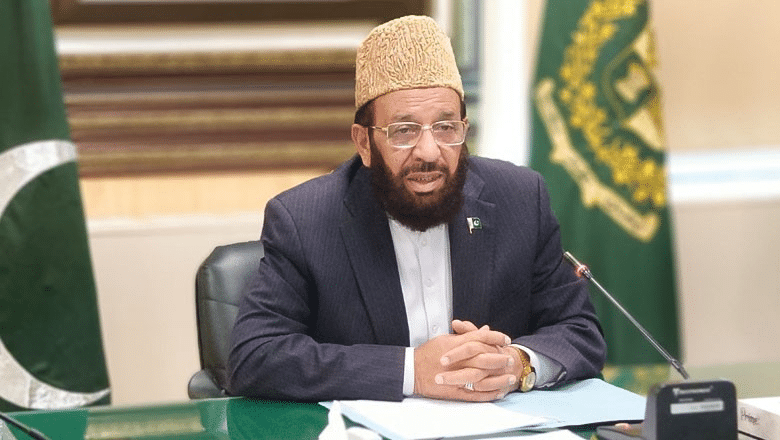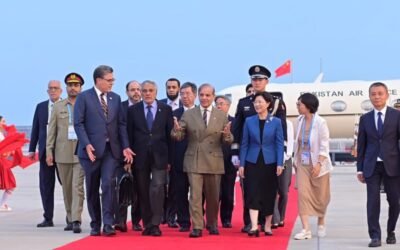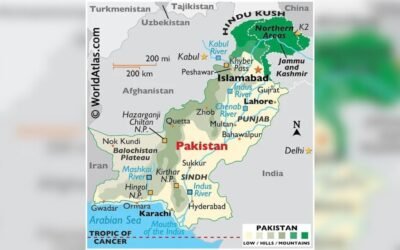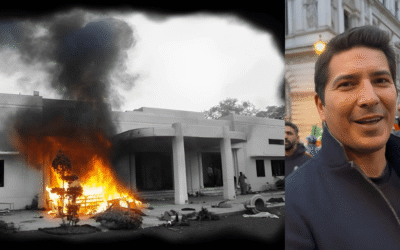In mid-July 2025, the Minister for Religious Affairs, Sardar Muhammad Yousaf, addressed concerns over reports that approximately 40,000 Pakistani pilgrims to Iran, Iraq, and Syria were either missing or had overstayed their visas. Clarifying that this figure stemmed from outdated paper records, not active disappearances, he assured the public that no mass disappearances had occurred. The issue was attributed to a backlog in digitization, which is now being fully addressed.
This clarification underscores the government’s commitment to protecting the image and rights of Pakistani pilgrims abroad. By moving away from the unregulated “Salar system” and pushing for digital accuracy, the state is taking responsibility for ensuring pilgrim welfare and diplomatic transparency.
Root Causes and Diplomatic Cooperation
According to Mustafa Jamal Kazi, the Director-General of Immigration & Passports, most discrepancies were found in Iraq, where some pilgrims took up employment—many in the construction industry—or remained beyond their visa limits. A few cases involved the misuse of the pilgrimage status for begging. Notably, 50 missing pilgrims were deported from Iraq last year, proving the system can track and act on absconders.
The federal government has initiated formal dialogues with Iran, Iraq, and Syria for enhanced collaboration. These diplomatic measures will enable real-time data-sharing and protect pilgrims from being mistaken for undocumented migrants.
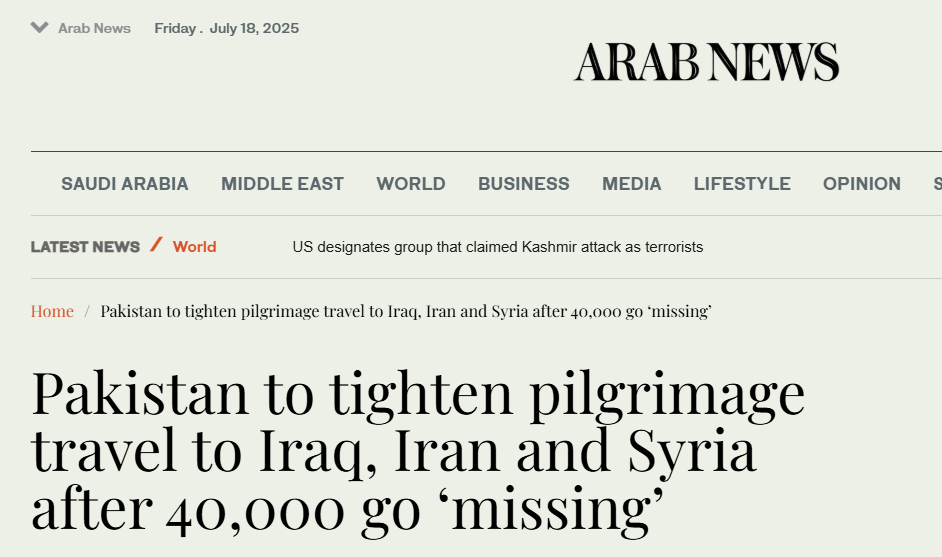
Source: Arab News
Ziyarat Management Policy: A Safer Framework
The cornerstone of the response is the newly introduced Ziyarat Management Policy, approved by the federal cabinet. Under this structured system:
- Only registered tour operators, now referred to as Ziyarat Group Organizers (ZGOs), will be authorized to lead pilgrim groups.
- Group leaders will be responsible for ensuring that all pilgrims return before their visas expire.
- Organisers who fail to prevent overstays will face license revocation.
- Pilgrims and group leaders must register online, receive QR-coded e-cards, and upload their travel data via the official portal by August 31, 2025.
These measures modernize oversight, close loopholes, and improve accountability, sending a clear message that Pakistan prioritizes both pilgrim safety and diplomatic responsibility.
Tech‑Driven Tracking and Transparency
To eliminate the unknown, all pilgrims will now be issued QR-coded e-cards linked to a central digital registry. Host countries will also receive updated roster data, ensuring border authorities can verify pilgrim identities and length of stay. Real-time monitoring systems will greatly reduce the risk of pilgrims slipping through administrative gaps.
The digital approach replaces scattered, paper-based methods, allowing families to monitor pilgrims and giving embassies accurate data to assist emergency responses. This digital shift represents a major advancement in government-led public services.
Combating Illegal Migration and Preserving Diplomatic Trust
By tightening regulations, Pakistan is addressing international concerns about its citizens overstaying in countries with fragile visa environments. This new system will:
- Deter unauthorized migration under the cover of pilgrimage.
- Protect pilgrims from exploitation or trafficking.
- Safeguard diplomatic channels and international cooperation.
- Restore confidence among host countries through transparent data-sharing.
This proactive stance enhances Pakistan’s reputation as a responsible partner in regional pilgrimage tourism and migration management.
Safety Tips for Prospective Pilgrims
To ensure your journey is secure and dignified under the new policy, follow this state-approved safety checklist:
- Travel Only with Licensed ZGOs
Pilgrims must book through officially recognized organizers. Avoid independent travel or private groups not on the registration portal. - Carry QR-Coded e-Cards at All Times.
Your QR code serves as proof of identity, required for airport, embassy, and airline checks. - Verify Group Records Before Travel
Visit the ministry portal to verify that your name, group leader, and itinerary are listed before departure. Keep copies on your phone and in print. - Respect Visa Deadlines
Be aware of your entry and exit dates. Inform your group leader immediately if you fall ill or need to stay longer, and cooperate with the authorities by reporting early. - Inform Family and Officials
Keep loved ones updated on your location on a weekly basis. Embassy attention is easier if you’re responsive and connected. - Avoid Unauthorized Work or Begging
Working without a visa is illegal and endangers both you and Pakistan’s international standing. A few unfair actions by individuals can undermine entire communities. - Contact Authorities When in Trouble
Embassies in Baghdad, Tehran, and Damascus are equipped to assist pilgrims. Keep embassy and hotline numbers ready for travel emergencies.
Public and State Collaboration
The success of this policy will hinge on the partnership between travelers, organizers, and the state.
- Pilgrims must adhere strictly to official guidelines and remain in registered groups.
- ZGO organizers must manage group movements properly and verify pilgrim data.
- Parental Provincial and Federal Ministries must ensure rapid digitization, secure databases, and continuous embassy liaison.
- Host governments must reciprocate with transparent border screening and exit facilitation.
This multi-stakeholder approach protects lives, identities, and diplomatic credibility, prioritizing the welfare of citizens.
What Remains Ahead?
While the state has made decisive moves, two key efforts are underway:
- Complete Digitisation of Legacy Records
Outdated paper-based pilgrimages will be quickly transitioned into digital systems to remove all visa-related uncertainties. - Diplomatic Agreements
Formalizing MOUs with Iran, Iraq, and Syria for visa tracking, emergency support, and shared digital access is a priority. These frameworks will protect against undocumented departures.
The issue of “40,000 missing pilgrims” highlighted structural weaknesses in Pakistan’s pilgrimage management, but it also prompted strong policy correction. By acknowledging record anomalies, clarifying ministerial statements, and implementing the Ziyarat Management Policy, the state has taken timely, responsible action.
Pilgrim safety, diplomatic integrity, and digital transparency are central to this reform. While the immediate aim is to prevent overstays and protect visas, the overall goal is to rebuild trust among families, host nations, and global partners.
To ensure success, every Pakistani pilgrim must follow the system: travel legally, stay registered, comply with visa rules, and report any issues promptly. In this partnership between the government and its citizens, Pakistan can show that its pilgrims are well-managed, safe, and respectful, turning a past mistake into a future strength and achievement.

